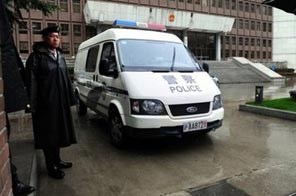Rio Tinto trial to wrap up in China
SHANGHAI: China on Wednesday was due to wrap up the politically sensitive trial of four employees of mining giant Rio Tinto, after testimony about millions of yuan in bribes stuffed into bags and boxes.
Australian executive Stern Hu and three other Chinese employees have been in the dock in a Shanghai court since Monday on charges of bribery and stealing trade secrets, amid concerns about whether they are getting a fair trial.
All four defendants in the high-profile case have pleaded guilty to taking money, defence lawyers say, although challenging aspects of the charges.
Australian Foreign Minister Stephen Smith chastised China for locking the country's diplomats out of the trial during the hearings on the commercial espionage allegations and said he was not expecting a verdict for days.
Witnesses testified that tens of millions of yuan were put in cardboard boxes, locked money boxes, "reusable" bags and delivered by hand to Hu and others, according to a report in the state-run National Business Daily.
Hu, the head of the Anglo-Australian mining giant's Shanghai office, and the three Chinese men -- Wang Yong, Liu Caikui and Ge Minqiang -- have disputed several aspects of the charges against them, defence lawyers have said.
Wang's attorney Zhang Peihong said all four had pleaded guilty to taking money, but there had been "intense debates in the court" about the amounts involved.
Wang has strongly objected to the bribery allegations, saying he had simply borrowed the money from one of China's richest men, Du Shuanghua, the report said.
Du, the former head of Shandong-based Rizhao Iron & Steel group, contradicted Wang's account in court, testifying that he had paid the Rio employee nine million dollars for preferential treatment, the newspaper said.
The bribes were paid per tonne of iron ore and were made in dollars before the global financial crisis and in yuan afterwards, it added.
Australia's government has said Hu "made some admissions" in court, without elaborating. Rio, the world's third-biggest miner, has previously said it was not aware of any wrongdoing by its employees.
The four were arrested in July during contentious iron ore contract talks between top mining companies and the steel industry in China, the world's largest consumer of the raw material. Those talks eventually collapsed.
The initial hearings related to the bribery allegations were open, although restricted to some state media outlets.
But the case moved behind closed doors on Tuesday for the commercial espionage charges and even Australian diplomats have been excluded from the courtroom.
"We regret that and have made that point clear to Chinese officials," the Australian foreign minister told national broadcaster ABC.
"We are also expecting, in the normal course of events, that the court will adjourn to consider its verdict and to consider sentencing if that's required," Smith added.
"There may well be some time, a matter of days, between the end of the hearing today and those further processes."
China has insisted the case was being handled in accordance with law and consular agreements, and that it is keeping Australia -- a key trading partner -- informed about the proceedings.
The case is widely seen as a test of the rule of law in China and has raised questions about doing business in the world's third-largest economy, a huge consumer of Australian resources.
Under Chinese law, the toughest sentence for non-government officials convicted of accepting bribes is 15 years in prison, Zhang said.






